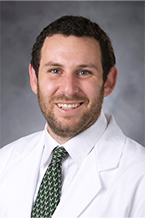
This spring, 17 faculty members at Duke University School of Medicine have been awarded distinguished professorships. The new distinguished professors will be honored at the university’s annual distinguished professorship event on May 14.
In total, the Board of Trustees in February approved distinguished professorships to 31 faculty across Duke University, effective July 1, 2025, or thereafter.
Distinguished professorships are awarded to faculty who have demonstrated extraordinary scholarship in advancing science and improving human health.
The 2025 recipients from the School of Medicine are:
James B. Duke Distinguished Professor of Medicine

J. Andrew Alspaugh, MD
J. Andrew Alspaugh, MD, is a professor and chief of the Division of Infectious Diseases in the Department of Medicine. He also has appointments in the Department of Cell Biology and the Department of Molecular Genetics and Microbiology. His research focuses on understanding the ways in which microorganisms sense and respond to changes in their environment. He is renowned for his groundbreaking work in the molecular pathogenesis of human fungal infections including cryptococcosis, a serious illness affecting highly immunosuppressed individuals.
James B. Wyngaarden Distinguished Professor of Medicine

Cathleen Colón-Emeric, MD, MHS
Cathleen Colón-Emeric, MD, MHS, is a professor and chief of the Division of Geriatrics and Palliative Care in the Department of Medicine. Her current research focuses on preventing osteoporotic fractures and promoting recovery in older adults after health stressors. She has developed and tested numerous interventions to reduce injurious falls and fractures in post-acute and long-term care facilities, and her work on physical resilience has positioned her as an international thought leader in the field. Her contributions have improved health in vulnerable populations and promoted recovery after health challenges.
Wilburt C Davison Distinguished Professor of Pediatrics

Gregory Crawford, PhD
Gregory Crawford, PhD, is a professor of pediatrics in the Division of Medical Genetics. He also has an appointment in the Department of Molecular Genetics and Microbiology. His primary research interest is understanding how the genome is regulated, in particular identifying and characterizing how genes are turned on and off in different cell types, tissues, development states, environmental responses, diseases, and individuals. By understanding where all gene regulatory elements are located, how they work to regulate gene expression, and how non-coding variants within these regions affect function, his research program addresses important basic and clinical questions.
Lincoln Financial Group Professor of Neurobiology

Birgit Frauscher, MD, PhD
Birgit Frauscher, MD, PhD, is a professor of neurology, director of the Duke Comprehensive Epilepsy Center, and an adjunct professor in the Department of Biomedical Engineering. She is dedicated to improving diagnosis and prognosis of people with epilepsy by developing new methods based on advanced electroencephalography techniques. Her research interests include the development of novel seizure-independent EEG markers for the epileptogenic zone in order to achieve more accurate diagnosis; investigation of the interactions between sleep and epilepsy; and the use of invasive intracranial EEG for studying brain physiology to better delineate normal from abnormal intracranial EEG activity.
Duke Health Distinguished Professor of Cell Biology and Biomedical Engineering

Amy Susanne Gladfelter, PhD
Amy Susanne Gladfelter, PhD, is a professor of cell biology who also has an appointment in the Department of Biomedical Engineering in the Pratt School of Engineering. Her research explores the fundamental mechanisms of cell organization, focusing on the biological and biophysical principles linking cell structure and function, with particular emphasis on membrane-less organelles and syncytial cells, which have many nuclei sharing a common cytoplasm. These unique cellular architectures raise fundamental questions about nuclear coordination and regulation within complex systems. Her interdisciplinary approach, incorporating insights from biology, biophysics, material science, and molecular biology, has reshaped our understanding of cellular dynamics.
Edwin Crowell Hamblen Distinguished Professor of Reproductive Biology and Family Planning

Brenna L. Hughes, MD
Brenna L. Hughes, MD, is a professor of obstetrics and gynecology. She specializes in maternal-fetal medicine with a focus on reproductive infectious diseases. Her work has significantly advanced the management of high-risk pregnancies and the treatment of fetal conditions, directly impacting maternal and neonatal health. Her interdisciplinary contributions, particularly in infectious diseases and immunology, have enhanced the understanding of pregnancy outcomes, and her research on congenital and perinatal infections has been pivotal in reducing maternal and infant morbidity and mortality. She is also a leading researcher in the prevention and management of congenital cytomegalovirus infection.
Alter Geller Distinguished Professor in Immunology

Micah Luftig, PhD
Micah Luftig, PhD, is a professor and vice chair in the Department of Molecular Genetics and Microbiology. He also has appointments in the Departments of Medicine, Integrative Immunobiology, and Cell Biology. His research focuses on viruses that cause cancer, with an overarching goal of defining the basic molecular mechanisms underlying pathogenesis and leveraging these findings for diagnostic value and therapeutic intervention. His work primarily focuses on the common herpes virus, Epstein-Barr virus. He uses cross-disciplinary approaches to characterize the temporal dynamics and single cell heterogeneity of EBV infection to discover vulnerabilities in EBV-associated diseases and characterize new therapeutic interventions.
Gorrell Family Distinguished Professor in Children’s Psychiatry

Gary Maslow, MD
Gary Maslow, MD, is a professor and co-director of the Division of Child and Family Mental Health and Community Psychiatry in the Department of Psychiatry and Behavioral Sciences. He also has appointments in the Department of Pediatrics and the School of Nursing. He focuses on promoting positive youth development for children with chronic conditions such as diabetes, cancer, epilepsy, and intellectual/developmental disabilities. He has been instrumental in developing and evaluating health systems innovations to improve mental health care within primary care settings. He has also made significant contributions to the field of adolescent and young adult transitions to adulthood.
Minnie Geller Distinguished Professor in Genetics

Hiroaki Matsunami, PhD
Hiroaki Matsunami, PhD, is a professor of molecular genetics and microbiology who also has appointments in the Departments of Neurobiology and Cell Biology. His research focuses on the molecular mechanisms underlying chemosensation (taste and smell) in mammals. Using molecular biology, genome science, and genetics, he explores questions including how mammals detect and differentiate between thousands of distinct chemicals as odors, how this information is coded in sensory cells and the brain, and how it influences behavior. His research has provided insights into the genetic basis of odor perception variability among humans, identifying receptor mutations that explain why certain odors are perceived differently by different individuals.
J. Buren Sidbery Distinguished Professor of Pediatrics

Michael Anthony Moody, MD
Michael Anthony Moody, MD, is a professor of pediatrics and also has an appointment in the Department of Integrative Immunobiology. He is the director of the Duke Collaborative Influenza Vaccine Innovation Centers Vaccine Center at the Duke Human Vaccine Institute and director of the Children’s Health & Discovery Initiative at Duke University. His research focuses on B cell responses to pathogens such as influenza, syphilis, and emerging infectious diseases. He has also extensively studied the immune response to HIV infection and the development of HIV vaccines. His lab is a resource for human phenotyping, flow characterization, staining and analysis at the Duke Human Vaccine Institute.
Catherine Wilfert Distinguished Professor of Medicine

Susanna Naggie, MD
Susanna Naggie, MD, is a professor of medicine, vice dean for clinical and translational medicine, and director of the Duke Clinical and Translational Science Institute. She is a global authority on clinical initiatives to bring new antiviral agents to patients and a clinical investigator with a focus on clinical trials in infectious diseases and translational research in HIV and liver disease. Her insights into managing viral infections have been pivotal in advancing treatment and prevention strategies. Her expertise in clinical virology allowed her to pivot during the COVID-19 pandemic, applying her knowledge to combat the virus effectively.
J.P. Gibbons Distinguished Professor of Psychiatry and Behavioral Sciences

Moira Rynn, MD
Moira Rynn, MD, is a professor and chair of the Department of Psychiatry and Behavioral Sciences. She is an internationally renowned expert in the treatment of pediatric mood and anxiety disorders and has spent her career focused on improving treatments for children, adolescents, and young adults with these conditions. Her most recent studies have examined novel augmentation treatment strategies for pediatric Obsessive-Compulsive Disorder and treatment models for adolescent depression in the primary care setting. Her work has provided critical insights into the efficacy and safety of antidepressants and other psychotropic medications for pediatric anxiety and mood disorders.
Joseph A. C. Wadsworth Distinguished Professor of Ophthalmology

Daniel Saban, PhD, MS
Daniel Saban, PhD, MS, is a professor and vice chair of research strategy in the Department of Ophthalmology. He also has an appointment in the Department of Integrative Immunobiology. His research focuses on the intricate links between the human immune system and nervous system and how those connections affect health and disease. He explores the immune mechanisms underlying ocular diseases, a field known as ocular immunology. His interdisciplinary approach addresses complex questions about eye health and disease, leading to targeted treatments for blinding and otherwise debilitating conditions such as age-related macular degeneration and other forms of retinal degeneration and corneal diseases.
James Wyngaarden Distinguished Professor of Medicine

Stefanie Sarantopoulos, MD, PhD
Stefanie Sarantopoulos, MD, PhD, is a professor and chief of the Division of Hematologic Malignancies and Cellular Therapy in the Department of Medicine. She also has an appointment in the Department of Integrative Immunobiology. Her work focuses on improving outcomes for patients with leukemia, lymphoma, multiple myeloma, and other conditions through innovative translational research. She is an internationally renowned expert in developing safer and more effective immune cell therapies for patients with hematological malignancies and autoimmune diseases. Over the last decade, she has been at the forefront of studies of B cell fate and function after allogeneic hematopoietic stem cell transplantation.
George Barth Geller Distinguished Professor of Neurobiology

Anne E. West, MD, PhD
Anne E. West, MD, PhD, is a professor of neurobiology who also has an appointment in the Department of Cell Biology. Her research focuses on understanding at a cellular/molecular level how neuronal activity regulates the formation and maturation of synapses during brain development. She uses genetic model systems to understand how defects in this developmental process lead to cognitive dysfunction. She has made important advances in understanding the molecular basis of addiction and depression, and her work has advanced understanding of how the genome interacts with sensory experiences to shape behavior and how genetic mutations in epigenetic regulators lead to brain disorders.
F. Bayard Carter Distinguished Professor of Obstetrics and Gynecology

Steven Young, MD, PhD
Steven Young, MD, PhD, is a professor and chief of the Division of Reproductive Endocrinology and Infertility in the Department of Obstetrics and Gynecology. His research focuses on disorders involving the uterine lining, known as the endometrium. His lab is interested in the cellular and molecular basis of disorders that involve estrogen, progesterone, immune function, endometriosis, and embryo implantation. He has made significant contributions to the field of reproductive medicine, advancing knowledge at the interdisciplinary intersections between immunology and reproductive endocrinology as well as understanding of the mechanisms by which progesterone and estradiol control uterine function.
James B. Duke Distinguished Professor of Biochemistry

Pei Zhou, PhD
Pei Zhou, PhD, is a professor of biochemistry who also has an appointment in the Department of Chemistry. His research focuses on the elucidation of the structure and dynamics of protein–protein and protein–ligand interactions and their functions in various cellular processes. His investigation spans several critical areas, including bacterial antibiotic resistance, membrane biosynthesis, and translesion DNA repair. His work has advanced the field of structural biochemistry, enabled the discovery of new enzyme functions and signaling pathways, and paved the way for new antibiotics to combat multidrug-resistant bacteria and innovative cancer treatments targeting translesion repair mechanisms.